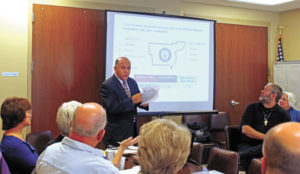
By Celine Klosterman
IOWA CITY — Discussion on multicultural ministry, the upcoming bishops’ synod on the family and the ongoing parish planning process filled the Davenport Diocese’s Diocesan Pastoral Council (DPC) meeting at St. Patrick Church Nov. 9.
Miguel Moreno, the diocese’s new coordinator of multicultural ministries, shared his vision with the group, an advisory board to Bishop Martin Amos. Moreno’s goals include:
• building relationships with parish leaders of diverse communities;
• working with other diocesan departments on ministries including a Spanish-speaking permanent diaconate and promoting religious vocations; and
• connecting with local groups that serve diverse populations.
He said clergy, religious and lay leaders in the diocese minister to Catholics including Hispanic, Vietnamese, Filipino, Burmese and Korean communities.
A DPC member asked: Shouldn’t the Church work to ultimately integrate communities of immigrants and native-born Americans? Yes, Moreno said. “We don’t want two churches.”
Organize a bilingual concert or invite people to a meal with food from different cultures, he suggested. A DPC member shared an example of Catholics who recited the rosary together in different languages and distributed printed translations of the prayers.
But ministry focused primarily on immigrants remains vital, Moreno said. As years pass, more immigrants will speak English, but fewer will be Catholic if the Church doesn’t reach out to them now.
Seminaries are preparing men to work with different cultures, Bishop Amos said. “We encourage priests to be pastorally bilingual.” Also, men in English-language deacon formation will receive training to lead wedding rites and other celebrations in Spanish, Moreno said.
Later, DPC members shared their responses to questions on challenges facing modern families and on how effectively the Church has promoted its teachings on sexuality, marriage and family life. The responses of Catholics worldwide will be used to prepare for the October 2014 Extraordinary Synod of Bishops called by Pope Francis to discuss such issues.
Secular society dismisses natural law, but Catholics must take a pastoral approach to people in relationships not in line with Church teaching, DPC members said. They addressed questions on topics including divorce, remarriage, annulments, same-sex unions, cohabitation and spouses’ openness to life.
Catholics may participate in the survey by visiting www.davenportdiocese.org by Dec. 1.
Finally, DPC members shared updates on how their parishes continue to collaborate in preparation for a future with fewer priests. Four diocesan priests will reach the retirement age of 70 by June 2014, and seven active priests older than 70 could also choose to retire next summer, said Sister Laura Goedken, OP, diocesan director of development. Two transitional deacons expect to be ordained priests for the diocese in the summer.
St. Anne’s in Welton, a 39-family parish whose church needs prohibitively expensive repairs, will close in July 2014.
Some other parishes have more Masses than needed, said Father George McDaniel, diocesan chancellor. According to canon law, a priest may not celebrate the Eucharist more than once a day except in certain cases. “If there is a shortage of priests, the local ordinary can allow priests to celebrate (the Eucharist) twice a day for a just cause, or if pastoral necessity requires it, even three times on Sundays and holy days of obligation” (Canon 905).
Mike Panther said that after his parish of Holy Family in Fort Madison dropped the number of Sunday Masses from three to two, the liturgies were filled with more Catholics. “People got more out of it.”
Each year, at the diocese’s request, parishes record the number of people attending Masses the first two weekends in November. A DPC member asked whether the diocese might collect parish Mass counts once a month to better gauge attendance. Bishop Amos said the current practice already requires much effort.
The next DPC meeting is April 12, 2014.







